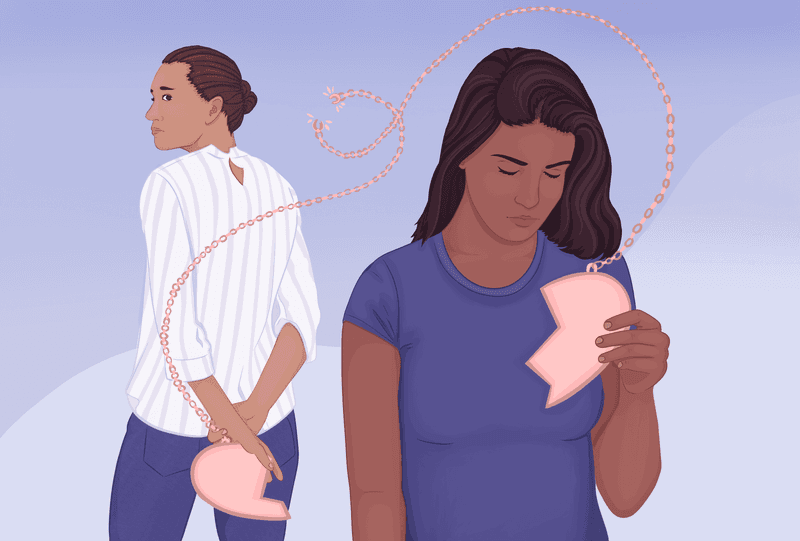Recognizing when your partner is no longer seeking you out can be both heartbreaking and eye-opening. This guide aims to help you identify subtle signs of a fading connection and understand the underlying emotional shifts.
By observing behavioral changes, you can gain insight into the health of your relationship and decide whether it’s time for a heartfelt conversation or a reassessment of your mutual needs.
1. Conversations Feel More Like Chores
Conversations used to flow effortlessly, like leaves gliding on a stream. Now, every exchange feels like an uphill battle, a chore to tick off a list. The laughter that once punctuated your words is now conspicuously absent. It seems like each sentence is weighed down by an invisible burden, making even the simplest dialogue feel strained.
Such changes might indicate an emotional distance forming between you. This lack of engagement can be a clear sign that one or both partners are emotionally checked out. Once lively discussions are replaced by a series of monosyllabic responses or disinterested nods.
Rekindling genuine communication can be key to understanding and bridging the gap, but it requires mutual commitment.
2. Physical Affection Has Become Rare
Remember those spontaneous hugs, the soft touches, and the warmth of holding hands? Those moments might now feel like distant memories. Physical affection is a powerful way to express love, and its absence can speak volumes about the state of a relationship.
When the tender gestures become rare, it might suggest a growing emotional chasm. A partner withdrawing from physical contact could be grappling with unresolved feelings or simply losing interest. It’s essential to address these changes openly.
Discussing feelings about intimacy and understanding each other’s needs can help reconnect emotionally and physically. When love is present, it naturally invites the desire to be close and affectionate.
3. They Stop Making You Part of Their Plans
In the vibrant days of your relationship, plans were made together, whether it was a weekend getaway or a simple grocery run. Now, you find yourself increasingly left out of your partner’s plans. This exclusion can be a telling sign.
Being omitted from future engagements can leave you feeling like an afterthought rather than a priority. This shift might indicate that your partner is gradually disengaging from the shared life you once eagerly built together.
Addressing this behavior involves honest conversations about expectations and desires for the relationship. Reconnecting with shared experiences can help revive the bond and remind both of you why you started this journey together.
4. Eye Contact Happens Less Often
The eyes are often described as the windows to the soul. Frequent eye contact is a sign of connection and engagement. When this diminishes, it might suggest emotional withdrawal. You may notice your partner’s gaze shifting elsewhere, avoiding the deep looks that once bridged your hearts.
This avoidance might point to discomfort or unresolved feelings growing between you. Eye contact fosters intimacy, and its lack can leave you feeling isolated even when sitting side by side.
Bringing back this simple yet profound gesture can reignite intimacy. Try creating moments that encourage eye contact, like sharing stories or enjoying quiet evenings together.
5. They No Longer Ask About Your Day
Once upon a time, sharing the details of your day was an anticipated part of your routine. Questions about each other’s experiences showed care and an eagerness to stay connected. If these inquiries have dwindled, it may indicate a shift.
The absence of curiosity about your daily life can feel like a significant emotional distancing. It might suggest that your partner is less invested in your personal growth and experiences.
To rebuild this connection, start by sharing small snippets of your day voluntarily. Encourage reciprocal sharing to create a safe space for open communication, reminding both of you of the importance of staying involved in each other’s lives.
6. You Feel More Like a Roommate Than a Partner
Once, being together meant feeling like an inseparable team. Now, it feels more like you’re cohabiting with a roommate. The camaraderie and shared dreams seem to have faded into the mundane routine of daily life.
This transformation may indicate a loss of romantic connection. The partnership that once felt dynamic and engaging now feels like a practical arrangement, missing the emotional depth it once had.
Reigniting the spark takes effort and intention. Plan activities that emphasize teamwork and rekindle old interests. This can remind both partners of the joy and excitement that initially brought you together.
7. There’s a Sharp Decline in Kind Gestures
The small acts of kindness that once defined your relationship may have become scarce. Gone are the surprise notes, the thoughtful gestures that showed you cared. This decline can be a subtle yet powerful indicator of a fading emotional bond.
Kindness is a cornerstone of love, and its absence might reflect underlying issues that need attention. The effort that once came naturally now feels like a distant memory.
Reviving these gestures can rejuvenate the relationship. Start with simple acts of consideration, like brewing an extra cup of coffee or leaving a heartfelt note. These acts can become the building blocks for restoring affection and care.
8. Silence Fills the Space Where Laughter Used to Be
Remember when laughter echoed through your home, brightening your days and strengthening your bond? If silence has replaced this joy, it might be a sign of an emotional disconnect.
Laughter fosters connection and intimacy, and its absence can create a void. This silence might suggest that the joy and spontaneity in your relationship are waning.
To reignite laughter, seek out shared hobbies or watch a favorite comedy together. Rediscovering joy in each other’s company can help bridge emotional gaps and renew the vibrancy of your relationship.
9. They Avoid Resolving Conflict
Conflicts are inevitable in any relationship, but how they are handled can make all the difference. If your partner avoids resolving conflicts, it might indicate a deeper issue.
Avoidance can lead to unresolved grievances piling up, creating a barrier between you. This reluctance to engage might suggest a lack of commitment to maintaining the relationship’s health.
Encouraging open dialogue and setting ground rules for respectful communication can help address underlying issues. By facing conflicts together, you can reinforce your partnership and rebuild trust and understanding.
10. They Spend Less Time at Home Without Explaining
It used to be that home was a haven, a place where you both sought comfort and companionship. If your partner is spending less time at home without explanation, it might be a sign of distance.
Unexplained absences can create feelings of insecurity and mistrust. This behavior may indicate that your partner is seeking solace or excitement elsewhere.
Addressing this requires open communication about expectations and boundaries. Understanding each other’s needs for space and time apart can help create a healthy balance and prevent misunderstandings.
11. Emotional Support Becomes One-Sided
In a healthy relationship, emotional support is reciprocal. If you find yourself offering support without receiving it in return, it might be time to reevaluate the dynamics.
A one-sided emotional support system can leave you feeling drained and unappreciated. It may suggest that your partner is either unaware of your needs or unwilling to meet them.
Communicating openly about your emotional needs is crucial. Encourage your partner to express their own, creating a balanced exchange that nurtures both individuals. This mutual understanding can strengthen the relationship’s emotional resilience.
12. They Interrupt or Zone Out When You Speak
Communication is the lifeblood of any relationship. If your partner often interrupts or seems disinterested when you speak, it might indicate a fading connection.
Zoning out during conversations can make you feel undervalued and unheard. This behavior might reflect a lack of engagement or growing emotional distance.
To address this, create a space for attentive and uninterrupted dialogue. Set aside time to discuss important topics and practice active listening. This can help restore the feeling of being valued and understood in your relationship.
13. Big Life Events Feel Less Shared
Milestones and life events are meant to be celebrated together, reflecting shared joy and unity. If these occasions now feel like solo endeavors, it might suggest a disconnect.
Experiencing significant events without your partner can create feelings of loneliness and isolation. This lack of shared experiences might hint at a diminishing sense of togetherness.
Rekindling this connection involves conscious effort to celebrate wins, big or small, together. Planning joint celebrations or simply acknowledging each other’s achievements can bring back the sense of partnership and mutual support.
14. They Pull Away During Stress Instead of Turning Toward You
In times of stress, partners often turn to each other for comfort. If your partner pulls away instead, it might signal an issue.
Withdrawing during challenging times can create emotional distance and misunderstanding. It may suggest that your partner feels unsupported or unable to rely on the relationship for solace.
Opening a dialogue about stressors and coping strategies can help bridge this gap. Support each other through difficult moments to reinforce trust and connection, ensuring neither feels alone in their struggles.
15. Intimacy Feels Obligatory or Completely Absent
Intimacy is a vital component of any romantic relationship. If it feels obligatory or is completely absent, it might indicate a deeper problem.
When intimacy becomes a chore, it can create feelings of inadequacy and disconnection. This shift might suggest that the emotional foundation of the relationship needs attention.
Discussing feelings about intimacy openly and without judgment can help address underlying issues. Rebuilding trust and understanding can reignite the spark that once brought you together.
16. There’s No Curiosity About Your Thoughts or Feelings
Curiosity about each other’s thoughts and feelings is a cornerstone of emotional intimacy. If your partner seems indifferent to your inner world, it might suggest a fading connection.
This lack of curiosity can leave you feeling invisible and unimportant. It indicates that your partner may no longer prioritize understanding your perspective.
Reintroduce curiosity by sharing your thoughts and encouraging your partner to do the same. This can reignite interest and foster a deeper emotional connection, reminding both of you of the importance of mutual understanding.
17. They Don’t Seem to Miss You Anymore
The excitement of reuniting after time apart used to be palpable. If your partner no longer seems to miss you, it might be a sign of emotional distancing.
This indifference can create feelings of rejection and loneliness. It might suggest that the bond that once drew you together is weakening.
To reconnect, create opportunities for meaningful reunions by planning special activities or surprise gestures. These efforts can bring back the joy of being together and reinforce the emotional ties that bind you.
18. You Feel Criticized More Than Appreciated
Constructive criticism can help a relationship grow, but if it outweighs appreciation, it might signal trouble.
Consistent criticism can erode self-esteem and create a hostile environment. It indicates that the positive aspects of your relationship might be overshadowed by negativity.
Focus on expressing gratitude and acknowledging each other’s strengths. This shift in perspective can help rebuild appreciation and balance, reminding both partners of the value and love they bring to the relationship.
19. You Keep Wondering if You’re the Only One Still Trying
Feeling like the sole contributor to a relationship might suggest a deeper issue. If you’re constantly questioning your partner’s commitment, it could indicate an imbalance.
This feeling can lead to resentment and exhaustion, making the relationship feel burdensome. It might suggest that your partner is either unaware of your efforts or unwilling to match them.
Communicating openly about each other’s contributions and expectations can help address this imbalance. By working together to create a more equitable dynamic, you can ensure both partners feel valued and invested.




















